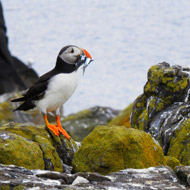Concerns over plan for managing Welsh seas

The Welsh Marine Plan area covers around 32,000 km² of sea and 2,120 km of coastline.
Wildlife organisations have raised concerns over a new plan for managing Welsh seas.
The Draft Welsh National Marine Plan, which is currently under consultation, aims to guide the sustainable development of Welsh Marine areas. It is the first marine plan of its kind and sets out the Welsh government’s vision for clean, healthy and biologically diverse seas.
But Clare Reed from the Marine Conservation Society told BBC News that the plan needed to do more to show how it intends to protect wildlife.
"We are concerned that the current inclusions of strategic resource areas - mapped areas for growth of marine industry - may have significant negative consequences for marine wildlife and the habitats on which they depend,” she said.
RSPB Cymru director Katie Jo Luxton added that some of the policies set out in the plan undermine the Welsh government’s commitments to sustainable development. She said that support for a number of tidal lagoon energy schemes was the worst example.
The WWF welcomed the plan but said that it had concerns about the emphasis placed on "extracting maximum economic benefit from Welsh seas, without sufficiently assessing how that will affect the resilience of our marine ecosystems."
The Welsh Marine Plan area covers around 32,000 km² of sea and 2,120 km of coastline. It outlines strategic objectives and presents both general and sector-specific policies in areas such as coastal tourism, aquaculture and renewable energy.
“In Wales, tourism, transport, marine energy, fisheries, aquaculture, telecommunications, and aggregates industries amongst many others are vitally important for our maritime economy,” said Lesley Griffiths, cabinet secretary for energy, planning and rural affairs.
“The plan supports these industries and our coastal communities, by providing an enabling framework for the sustainable use of Wales’ marine resources.”



 The veterinary mental health charity Vetlife is inviting the veterinary community to join it for a sponsored cold-water dip.
The veterinary mental health charity Vetlife is inviting the veterinary community to join it for a sponsored cold-water dip.